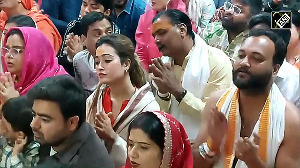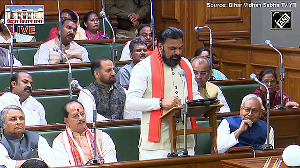'It's unfortunate that the prime minister prioritises his ego over the atrocities that women and tribals have had to suffer in Manipur.'

Congress Lok Sabha MP from Kaliabor, Assam, Gaurav Gogoi, who moved the no-confidence motion against the Narendra D Modi government, tells Prasanna D Zore/Rediff.com why he was chosen to move the motion, the significance of the move and how the Indian National Inclusive Developmental Alliance -- the alliance formed by 26 Opposition parties recently and named I.N.D.IA. -- through this no-confidence motion plans to highlight the plight of the people of Manipur and help improve the situation in the state riven by ethnic violence between the Meiteis and Kukis.
Why were you chosen to move the no-confidence motion against the Modi government on the issue of Manipur? Is it because you are from the North East?
From the beginning we wanted all parties in the I.N.D.IA. alliance (to move a no-confidence motion against the government). You have to understand why we have to move the no-confidence motion. It is because the prime minister continued to ignore the need for a debate in Parliament.
Even yesterday (July 25, 2023), in the letter written by the Union home minister, he completely ignored the fact that the chief demand of the I.N.D.IA. parties was that the prime minister make a statement.
And since the last two days they started passing bills (without taking cognisance of our demand) and clearly the situation was escalated by the lack of outreach from the ruling party (the Bharatiya Janata Party).
I.N.D.IA. then decided that we have to bring the no-confidence motion (against the government) because it is the absence of leadership of the prime minister which has escalated the situation to such a level in Manipur that now the conflict is slowly spreading to other parts of the North East including Assam and Mizoram.
When we stood up in Parliament, parties that make up I.N.D.IA. stood up in solidarity to give the message that India (the country) stands with the North East and we will all speak on the motion.
When we were submitting this motion from the Congress, the CPP (Congress Parliamentary Party) Chairperson (Sonia Gandhi) had instructed that even while introducing the motion, the North East should be represented.
Now that Lok Sabha Speaker Om Birla has admitted the no confidence motion, what will be the strategy adopted by I.N.D.IA. during the motion? How will you corner the prime minister or the government?
We are waiting for the Speaker to announce the date (when the no-confidence motion will be tabled in the Lok Sabha). We are yet to receive any information as to when the debate will take place.
We understand the Speaker has admitted it, but it is unfortunate that bills have been passed while the vote of no-confidence motion was being accepted.
It is incumbent upon the government to initiate the debate over the vote of no confidence as soon as possible.
Why do you think Prime Minister Modi is hesitant to address Parliament about Manipur?
There's a pattern at play that we have seen in the past. The prime minister wishes to take credit for any success achieved by his party. But when there are serious failures and loopholes he outsources those responsibilities and failures to his ministers, to his Cabinet, to his chief ministers; it's unfortunate that the prime minister prioritises his own image over the humanitarian situation that is unfolding in Manipur, prioritising his ego over the atrocities that women and tribals have had to suffer in Manipur.
Would I.N.D.IA. -- all the 26 Opposition parties -- chalk out a cohesive plan of action when the motion comes up for debate in the Lok Sabha?
Let the motion be taken up for debate. We are still waiting. Obviously, every day we are in consultation. This motion has also come up as a result of the deliberations that have taken place among I.N.D.IA. parties' strategic meetings.
While you may corner the prime minister and the government over the violence and ethnic cleansing in Manipur will it in any way help resolve the crisis in the state or help build bridges between the Meiteis and the Kukis and others in Manipur?
What purpose will this no-confidence serve?
The aim of the I.N.D.IA. parties while moving this vote of no-confidence is not about numbers, but sending a message of peace and solidarity with the people of Manipur at the time of their grief and suffering.
We want to reach out to them like Rahul Gandhi did when he visited the state. Our party wants to highlight the sufferings and injustice done to the people of Manipur through a debate.
We want to send a message that the prime minister may have forgotten to visit Manipur or speak about the people of Manipur and the injustices against them, but we have not forgotten them.
We stand with them. We are for Manipur. I.N.D.IA. wants justice for Manipur.

Will the Opposition come out with a plan, with a formula that will help the Meiteis and Kukis cohabit as peacefully together as they once cohabited?
Shouldn't the entire country's focus be that because as you pointed out this problem is now spreading to Mizoram and Assam?
Given the inter-ethnic relationship that various tribes share with each other across the north east, would you think the entire north east could get engulfed in the Manipur problem?
That is why from Day One we've been saying that we have to win the trust of the people of Manipur and the entire north east. People have lost their faith in the state government. Even the MLAs belonging to the BJP (in Manipur) have stated that there's a complete failure of the law and order machinery in the state.
That's why we feel that removing the chief minister (N Biren Singh) is an important step because he is a key stakeholder. It is his presence in the peace committee formed by the home minister (Amit A Shah) that has led to the failure of the peace committee. And there have been no meaningful dialogues.
We are for a meaningful resolution. We are for a dialogue to emerge from among the different communities, whether they are Meitei, Kuki or Naga or whether tribals and communities belonging to other parts of the north east. But for this dialogue to have taken place, the prime minister has to take the initiative.
In the past in India, whenever there has been a conflict, a prime minister, no matter which party he belongs to, has always taken leadership and tried to resolve the issue.
For the first time we are seeing a prime minister being so indifferent, visiting all parts of the world and all parts of India, choosing to remain silent for close to 80 days of what was unfolding in Manipur.
Only after a video became viral and the Chief Justice of the Supreme Court (Dr Dhananjay Yeshwant Chandrachud) made an observation that the prime minister chose to make a remark, but still forgot to include all the forms of atrocities that have taken place in (on the people of) Manipur and failed to appeal for peace and calm.
Was a no-confidence motion the only way for the Opposition to get the prime minister to speak in Parliament? Could it have been done in a better way? Because moving a no-confidence motion gives a sense of animosity.
Could there have been any other way to get the prime minister to speak?
As I said from Day One, the aim of I.N.D.IA. is to send a message of solidarity and that we want the voices and concerns of the people of Manipur to be heard and justice given to them without any discrimination.
People of Manipur have a lot of apprehensions and questions as to why a prime minister who has changed chief ministers in election going states -- Uttarakhand, Gujarat and Tripura -- is persisting with a chief minister under whose tenure more than 5,000 sophisticated weapons were looted from police stations by ordinary people and under whose reign so many Manipur people have been killed in violence?
Why is the prime minister continuing to support (such a chief minister)?
These are questions that only the prime minister can answer. Instead of talking about addressing the concerns of Manipur, he's talking about East India Company, Indian Mujahideen.
Instead of dealing it as a matter of national security, he is dealing with the issue most frivolously.
It's a question of preserving our national integrity and returning to the brotherhood that existed prior to this conflict. It is incumbent upon the prime minister, as the guardian of the people, to take cognisance and be more visible.
Home Minister Amit A Shah was willing to address the issue in the Lok Sabha. Why wasn't he allowed to make a statement on Manipur on behalf of the government? Why did the Opposition insist on Rule 267?
The home minister's intervention in Manipur has itself not yielded any results. His peace committee has failed. So, the situation calls for the prime minister to respond.
If the prime minister does not speak on such an issue inside Parliament, then when will he speak?
Is he there to only seek votes? Is he not there to resolve conflicts?











 © 2025
© 2025